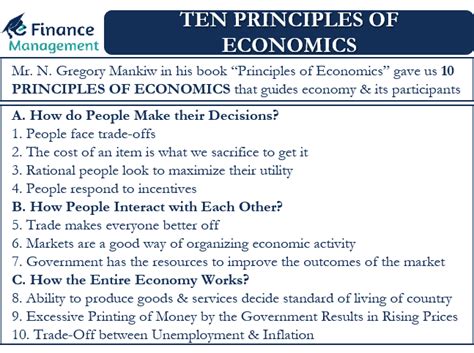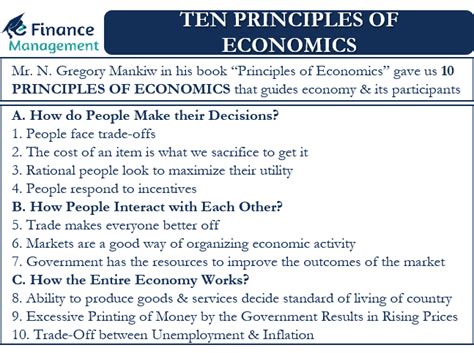1. Scarcity and Choice

At the core of economics lies the concept of scarcity, which arises from the limited nature of resources relative to the seemingly infinite human wants and needs. This fundamental principle underscores the necessity of making choices, as individuals, businesses, and governments must allocate resources efficiently to maximize their satisfaction or achieve their goals.
2. Opportunity Cost

Every choice carries an opportunity cost, representing the value of the next best alternative foregone. It highlights the trade-offs involved in decision-making, emphasizing the importance of considering all available options and their potential benefits.
3. Rationality and Self-Interest

Economics assumes that individuals and firms act rationally, seeking to maximize their utility or profits. This principle acknowledges that people make choices based on their self-interest, striving to optimize their well-being or financial gains.
4. Incentives and Behavior

Incentives play a pivotal role in shaping economic behavior. Whether in the form of prices, taxes, or regulations, they influence individual and collective actions, encouraging or discouraging certain behaviors and outcomes.
5. Markets and Prices

Markets are fundamental to economics, serving as platforms where buyers and sellers interact to determine prices and allocate resources. The law of supply and demand governs market dynamics, influencing the equilibrium price and quantity of goods and services.
6. Competition and Efficiency

Competition is a driving force in markets, fostering innovation, efficiency, and consumer welfare. It encourages firms to produce goods and services at the lowest possible cost, leading to lower prices and a wider range of choices for consumers.
7. Trade and Specialization

Trade and specialization are interconnected principles that enhance economic well-being. By specializing in the production of goods and services in which they have a comparative advantage, individuals and nations can trade to acquire a wider variety of goods, improving overall efficiency and prosperity.
8. Government Intervention

Governments play a crucial role in shaping economic outcomes through policies and regulations. They intervene to address market failures, promote social welfare, and maintain stability, often through taxation, subsidies, or direct provision of goods and services.
9. Macroeconomic Stability

Macroeconomic principles focus on the overall health and performance of the economy. Key indicators such as GDP, unemployment rates, and inflation levels are monitored to ensure stability and promote sustainable economic growth.
10. Monetary and Fiscal Policy

Governments and central banks employ monetary and fiscal policies to influence economic activity. Monetary policy involves managing the money supply and interest rates, while fiscal policy encompasses government spending and taxation decisions. These tools are used to stabilize the economy, promote full employment, and control inflation.
11. International Trade and Globalization
International trade and globalization have transformed the economic landscape, allowing nations to specialize, increase efficiency, and access a wider range of goods and services. This interconnectedness has led to the emergence of global supply chains and the spread of ideas, technologies, and cultural influences.
12. Human Capital and Education
Investing in human capital through education and training is crucial for economic growth and development. Skilled and knowledgeable individuals are more productive, innovative, and adaptable, contributing to a nation’s economic success and competitiveness.
13. Technology and Innovation
Technology and innovation drive economic progress, enhancing productivity, efficiency, and quality of life. They create new industries, improve existing ones, and lead to the development of novel products and services, shaping the future of work and consumption.
14. Income and Wealth Distribution
The distribution of income and wealth within a society is a critical economic issue. Unequal distribution can lead to social and economic disparities, impacting access to opportunities, resources, and basic needs. Addressing these inequalities is essential for fostering social cohesion and sustainable economic growth.
15. Environmental Sustainability
Economic activities have environmental consequences, and sustainable development requires balancing economic growth with environmental protection. This principle emphasizes the need for policies and practices that promote long-term ecological sustainability while meeting present needs.
16. Financial Markets and Institutions
Financial markets and institutions play a vital role in allocating resources, facilitating trade, and promoting economic growth. They provide a platform for investors to allocate capital efficiently, enabling businesses to access the funds needed for expansion and innovation.
17. Behavioral Economics
Behavioral economics challenges traditional economic assumptions by incorporating psychological and social factors into economic analysis. It recognizes that individuals may not always act rationally, and their decisions are influenced by cognitive biases, emotions, and social norms.
18. Economic Growth and Development
Economic growth refers to the expansion of an economy’s productive capacity, while development encompasses improvements in living standards, infrastructure, and social welfare. Both are essential for enhancing a nation’s well-being and competitiveness in the global economy.
19. Economic Systems
Different economic systems, such as capitalism, socialism, and mixed economies, shape the allocation of resources and the role of the government. Understanding these systems is crucial for analyzing and comparing their strengths, weaknesses, and suitability for different contexts.
20. Economic Policy Evaluation
Evaluating the effectiveness of economic policies is essential for informed decision-making. This principle emphasizes the need for rigorous analysis, considering both the intended and unintended consequences of policies, and the potential trade-offs involved.
🌟 Note: Economics is a dynamic and ever-evolving field, and these principles provide a solid foundation for understanding its core concepts and mechanisms.
Conclusion
Mastering the principles of economics empowers individuals and societies to make informed decisions, navigate complex economic landscapes, and shape a prosperous future. By understanding the interplay of scarcity, choice, incentives, and market forces, we can foster economic growth, promote social welfare, and ensure sustainable development for generations to come.
FAQ
What is the significance of scarcity in economics?

+
Scarcity is a fundamental concept in economics, arising from the limited nature of resources relative to unlimited human wants. It underscores the importance of making choices and allocating resources efficiently to maximize satisfaction or achieve goals.
How do opportunity costs influence decision-making?

+
Opportunity costs represent the value of the next best alternative foregone when making a choice. Considering opportunity costs helps individuals and firms make informed decisions by evaluating the trade-offs involved and maximizing their utility or profits.
What role do markets play in economics?

+
Markets are platforms where buyers and sellers interact to determine prices and allocate resources. They are governed by the law of supply and demand, which influences the equilibrium price and quantity of goods and services, promoting efficiency and consumer welfare.
How do governments impact economic outcomes?

+
Governments shape economic outcomes through policies and regulations. They intervene to address market failures, promote social welfare, and maintain stability, often through taxation, subsidies, or direct provision of goods and services.
What is the role of technology and innovation in economics?

+
Technology and innovation drive economic progress by enhancing productivity, efficiency, and quality of life. They create new industries, improve existing ones, and lead to the development of novel products and services, shaping the future of work and consumption.